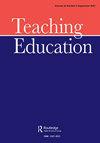Understanding culturally responsive practices in teacher preparation: an avenue to address disproportionality in special education
IF 1.1
Q2 EDUCATION & EDUCATIONAL RESEARCH
引用次数: 4
Abstract
ABSTRACT With the rapid increase of students from culturally and linguistically diverse backgrounds bringing a shift in the landscape in today’s schools, equity discourses continue to arise. For example, more than four decades of data have pointed towards the disproportionality (i.e. over- or -under-representation) of students from diverse cultural and linguistic backgrounds in special education in the United States, Europe, and beyond. As a continuous problem, there have not been enough studies exploring the state of general education teacher preparation programs and pre-service teachers’ use of culturally responsive practices (CRP) within referral models for special education. Knowing that teacher preparation is a key formation period for practicing teachers’ beliefs and knowledge the current study examined pre-service teachers’ knowledge and skills of culturally responsive practices within pre-referral models in order to address equity issues in special education (e.g. service delivery). Results from a fully integrated mixed methods study showed to be contradictory as the rating of pre-service teachers’ perceived knowledge and skills of CRP and pre-referral models to be high but their work indicated otherwise. Implications for teacher preparation programs include more in-depth learning experiences on CRP, disabilities, and engaging in equity discourses as part of pre-service teachers’ preparation.理解教师培养中的文化响应实践:解决特殊教育中不均衡现象的途径
随着来自不同文化和语言背景的学生的迅速增加,当今学校的格局发生了变化,平等话语不断出现。例如,四十多年的数据表明,在美国、欧洲和其他地区的特殊教育中,来自不同文化和语言背景的学生比例失调(即代表性过高或不足)。作为一个持续存在的问题,对于通识教育教师准备计划和职前教师在特殊教育转诊模式中使用文化响应实践(CRP)的现状的研究还不够。了解到教师培训是实践教师信念和知识的关键形成时期,本研究在转介前模型中考察了职前教师在文化响应实践方面的知识和技能,以解决特殊教育(例如服务提供)中的公平问题。一项完全整合的混合方法研究结果显示,职前教师对CRP和转诊前模型的感知知识和技能的评分较高,但他们的工作表明相反。对教师准备计划的启示包括对CRP、残疾和参与公平话语作为职前教师准备的一部分进行更深入的学习经验。
本文章由计算机程序翻译,如有差异,请以英文原文为准。
求助全文
约1分钟内获得全文
求助全文
来源期刊

Teaching Education
EDUCATION & EDUCATIONAL RESEARCH-
CiteScore
3.80
自引率
6.20%
发文量
15
期刊介绍:
Teaching Education is an interdisciplinary forum for innovative practices and research in teacher education. Submission of manuscripts from educational researchers, teacher educators and practicing teachers is encouraged. Contributions are invited which address social and cultural, practical and theoretical aspects of teacher education in university-, college-, and school-based contexts. The journal’s focus is on the challenges and possibilities of rapid social and cultural change for teacher education and, more broadly, for the transformation of education. These challenges include: the impact of new cultures and globalisation on curriculum and pedagogy; new collaborations and partnerships between universities, schools and other social service agencies; the consequences of new community and family configurations for teachers’ work; generational and cultural change in schools and teacher education institutions; new technologies and education; and the impact of higher education policy and funding on teacher education. Manuscripts addressing critical and theory-based research or scholarly reflections and debate on contemporary issues related to teacher education, will be considered. Papers should attempt to present research, innovative theoretical and/or practical insights in relevant current literature and debate.
 求助内容:
求助内容: 应助结果提醒方式:
应助结果提醒方式:


